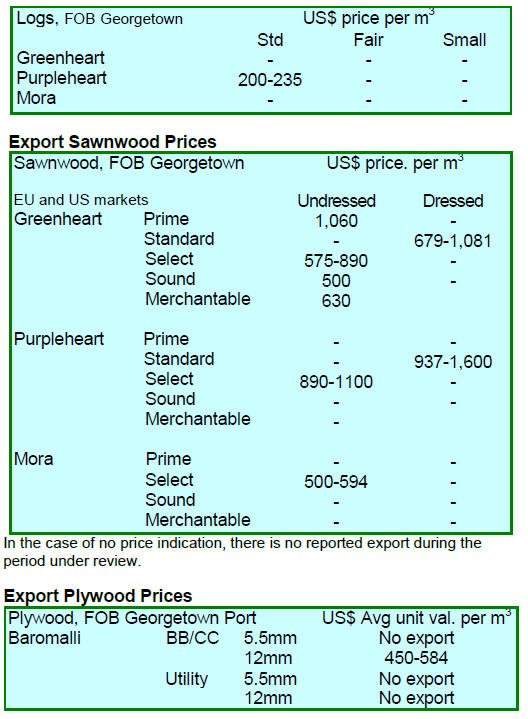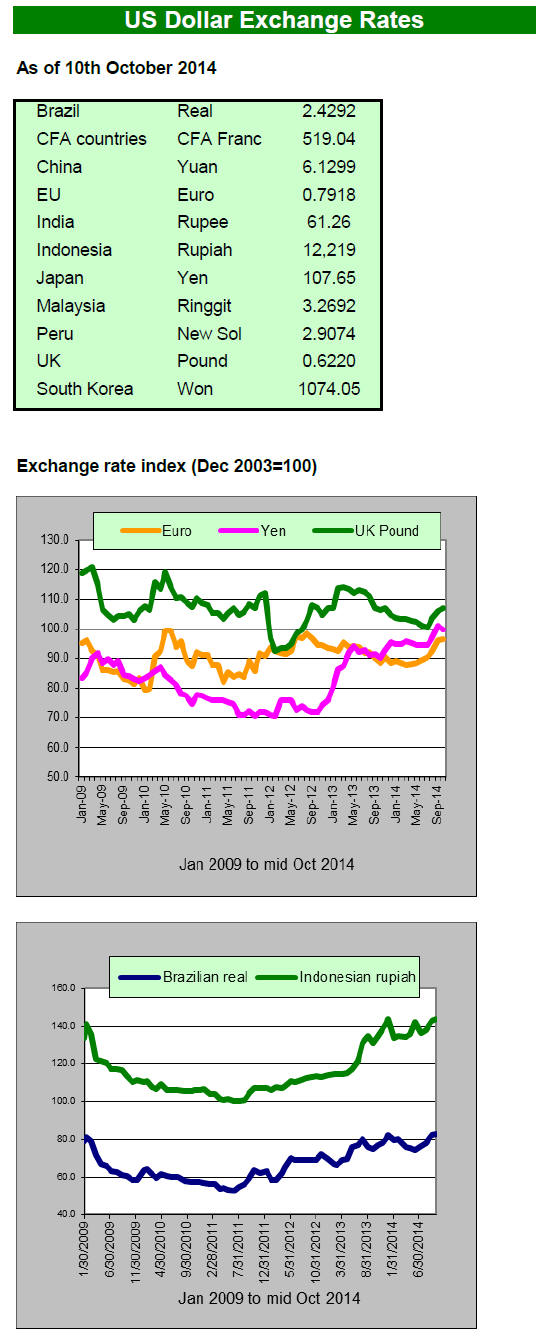2. GHANA
Minister inaugurates new Forestry
Commission Board
The Minister of Lands and Natural Resources, Mr. Nii
Osah Mills, has inaugurated an 11-member Forestry
Commission Board. The board is headed by a Forestry
Consultant, Edward Prah. The Minister tasked the board
with:
Providing strategic direction for the regulation of
the use of forest and wildlife resources.
Addressing the conservation and management of
the resources as well as coordination of policies
related to the forest and wildlife resources.
Focusing attention on delays in the conversion of
all leases to Timber Utilisation Contracts (TUCs),
which is critical for implementation of the
Voluntary Partnership Agreement (VPA) and to
efforts to halt the over-exploitation of rosewood
from ecologically fragile savanna ecosystem.
Overseeing the smooth implementation of the
New Forest and Wildlife Policy-2012. This has
shifted the focus from over-reliance on revenues
from timber production to biodiversity
conservation, ecotourism development and
watershed management and protection.
Helping tackle issues of deforestation and forest
degradation that are impacting biodiversity,
extinction of prime timber species, drying of
water bodies and climate change effects.
On the issue of deforestation and forest degradation, the
Minister said: ※There is a need to urgently restore the
rapidly declining values and functions of the forest to
ensure a continuous flow of benefits to all segments of
society now and in the future§.
Mr Prah, the Board Chairman, assured the Minister that
the board will work within the boundaries assigned them
and pledged the full cooperation of members to cordial,
effective, transparent but decisive working relations with
the management of the Commission.
Mr. Samuel Afari Dartey, Chief Executive Officer of
Forestry Commission is also on the Board.
Environment Minister calls for action to stem
environmental degradation
The first national conference, to commemorate „100 Years
of Forestry Practice and 50 Years of Forestry Research in
Ghana‟, was recently held in Kumasi.
Organised by the Council for Scientific and Industrial
Research (CSIR) Forestry Commission, College of
Agriculture and Natural Resources of the Kwame
Nkrumah University for Science and Technology and
Tropenbos International, the 2-days conference was
attended by industry stakeholders.
Speaking to the press, Dr Alfred Sugri Tia, a Deputy
Minister of Environment, Science, Technology and
Innovation (MESTI), tasked the agencies in the forestry
sector with addressing issues concerning policy,
accountability and monitoring of systems to stem
environmental degradation.
Association of Ghana Industries seeks government
support
The Association of Ghana Industries (AGI) has assured its
members of continued pressure on government to provide
much needed incentives to produce goods and services for
the domestic market.
This was made known by the Vice Chairman of the
Western Region of AGI, Mr. Ato Pamford, at its first
Industry and Technology (Indutech) Fair in Takoradi on
the theme ※Empowering existing and emerging industries
for sustainable development§.
In his opening address, Major Dr. Mustapha Ahmed, the
Acting Minister of Trade and Industry assured participants
that the government will continue to support and work
with the private sector through bodies such as the AGI in
their endeavour to spur economic growth.
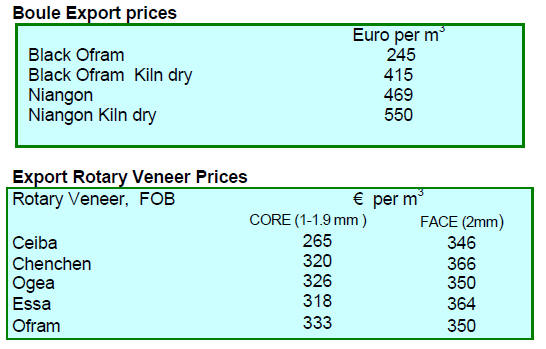
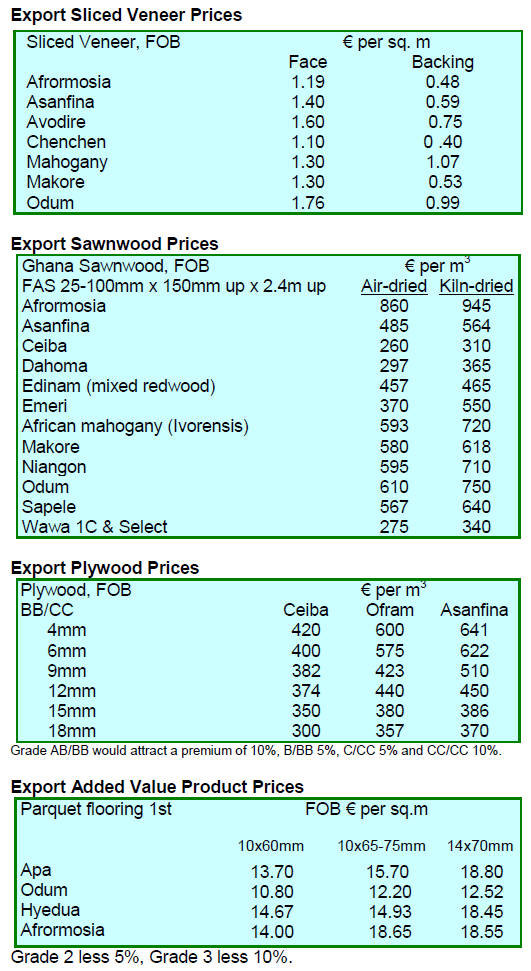
3. MALAYSIA
New tax and withdrawal of fuel subsidy to
impact
industry
The 2015 Malaysian budget was recently released with the
main thrusts being balancing economic development and
the well-being of the people and implementation of high
impact, low cost and efficient projects.
Malaysia‟s GDP is projected to grow by 5.0 每 6.0% in
2015 compared to this year‟s growth of 5.5 每 6.0%. The
government intends to bring the fiscal deficit down to
3.0% of GDP from this year‟s 3.5%.
A significant move was the introduction of a Goods and
Service Tax (GST) which will come into force 1 April
2015 at a rate of 6%. A wide range of items, considered
essential, will be exempted from the GST.
Analysts say the timber industry will need some time to
study the budget before an assessment can be made of its
implications on the timber sector.
There are some aspects in the budget which will certainly
have a negative impact such as the GST and the
elimination of petroleum subsidies. In contrast, incentives
to develop small and medium enterprises and incentives in
support of automation to reduce the dependence on foreign
labour could have a positive impact.
Sarawak exporters optimistic on growth in exports
Major timber companies in Sarawak are optimistic that
demand for wood products such as plywood, which has
enjoyed firm prices in recent months, will continue to
expand.
The Star newspaper quoted a spokesperson for Subur
Tiasa, a major producer in Sarawak, as saying: ※Timber
prices are not expected to experience any downside
volatility following the log export ban imposed by
Myanmar in April and in view of the increased demand
from timber consuming countries.§
Timber exporters are confident that demand will
strengthen in response to an anticipated upturn in
construction activities in major markets such as Japan and
some EU member states. International demand for
Sarawak logs has grown since Myanmar banned log
exports.
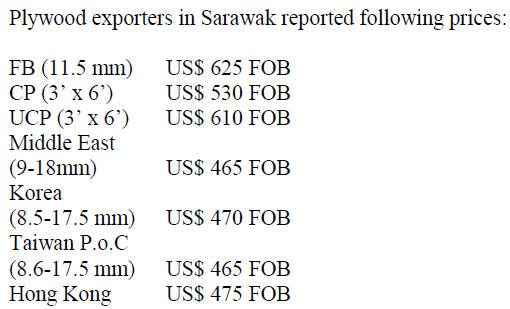
No more concession licenses
The fight against illegal logging in Sarawak further
intensified when the chief minister, Adenan Satem,
decided not to issue any more timber concessions until
satisfied timber smuggling was brought to a halt.
It has been reported that the government seized illegal
timber valued at around RM2.95mil (approx. US$
896,000) in the first nine months of this year, a 400%
increase year on year.
The Chief Minister surprised many by announcing the
arming of 50 Forestry Department enforcers to combat
illegal logging.
4. INDONESIA
PEFC endorses Indonesia*s certification
system
The Programme for the Endorsement of Forest
Certification (PEFC) has endorsed the Indonesian Forestry
Certification Co-operation (IFCC) which, says a PEFC
press release ※signifies a turning point for Indonesia, a
country which is still struggling with combating high
deforestation rates,§
Ben Gunneberg, Secretary General of PEFC International
said: ※Forest certification represents an important
mechanism to verify and promote sustainable forest
management, thus safeguarding the environmental, social
and economic benefits that forests provide.
This is especially important in a country like Indonesia
given the significance of its forest resources both in terms
of protecting its invaluable biodiversity and its
contribution to the livelihoods of the millions of people
that depend on forest resources to make a living.§
For the press release see: http://www.pefc.org/news-amedia/
general-sfm-news/1672-indonesian-forests-tobenefit-
from-pefc-certification
Holding company for state forestry enterprises
Indonesia‟s State-Owned Enterprises Minister, Dahlan
Iskan, has announced the creation of a holding company
for all state horticulture and forestry state enterprises, a
move which it is hoped will improve efficiency and
competitiveness.
The way ahead is to create a uniform policy framework for
the various enterprises and strengthen the work ethic but
this will not be easy because of the diverse nature of
operations and management of the different enterprises.
The new holding company will incorporate PT Plantation
Nusantara (PTPN) I to PTPN XIV and its parent company
PTPN III.
The holding company also includes state forestry
enterprises Inhutani I to V and the parent company PT
Perhutani.
The total assets of the forestry state-owned enterprises and
state-owned forestry plantation enterprises now brought
into the holding company amount to Rp 72.6 trillion
(plantation assets (Rp 69 trillion and forestry assets US$
3.6 trillion).
Indigenous people say forest management failing them
Indigenous people in Indonesia are looking to the new
government to review the management of customary
forests.
Chalid Muhammad, chairman of the Management Board
of the Association for Community and Ecologically-based
Law Reform (Perkumpulan HuMa), has said some of the
regulations applied to forestry concession holders resulted
in the denial of customary rights.
HuMa Program Coordinator Nurul Firmansyah added that
the indigenous people were ready to become involved in
managing forests, but there needs to be a legal basis for
their involvement.
Companies using fire to clear bush face lawsuits
The Environment Ministry has filed lawsuits against seven
agroforestry companies in Riau suspected of starting forest
fires in Sumatra in 2013. Himsar Sirait, the law
enforcement deputy in the ministry said that the results of
the investigation of the fires are now with the Attorney
General.
The ministry is also investigating two palm oil companies
and an industrial forest company suspected of starting fires
earlier this year.
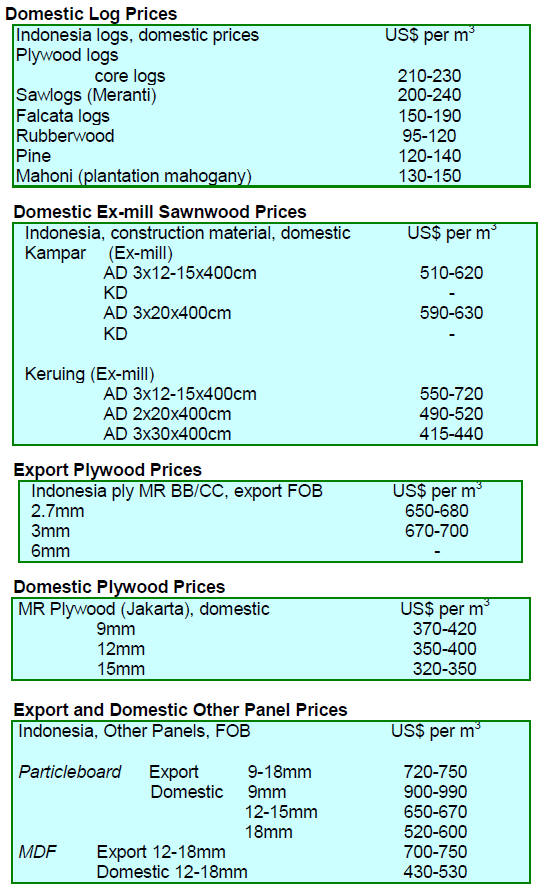
5. MYANMAR
Results of 29 September tender
Analysts say the convenient location fot the sale of logs on
the 29 September (Yangon area) played a big part in the
better prices that were received.
Observers report that only part of the stock of logs which
could not be shipped before the log export ban were sold
at the recent sale.
A substantial volume of logs still remain and as these have
not been paid for then ownership reverts to the Myanma
Timber Enterprise. Analysts say the remaining logs are of
poor quality as buyers shipped the better grade logs before
the log export ban.
The monsoon has ended in Myanmar but log harvesting
cannot begin for several months when forest roads become
passable once again. Until fresh logs come from the forest
millers will have to rely on the poor quality unshipped
logs.
The next open tenders are expected to be on 24 and 27
October.
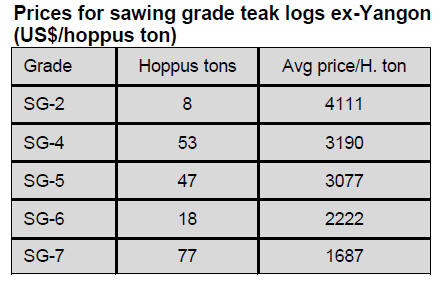
Severe penalties for illegal logging
The domestic press in Myanmar has quoted Director P.S.
Myo of the Forest Department as saying serious action
will be taken to address illegal logging. Promulgation of
new Forest Laws will include prison sentences for illegal
logging.
If the long jail terms are eventually included in the new
legislation observers anticipate this will deter most of the
culprits.
Trade surges but deficit widens
Total trade so far in the current financial year has risen by
more than 30 per cent over the same period last year
according to the latest data from the Ministry of
Commerce. From April 1 to September 26, the total value
of trade was US$13.45 billion, with exports at US$5.37
billion and imports at US$8.07 billion.
In the same period of last year total trade was US$10.08
billion, comprising US$4.66 billion in exports and
US$5.41 billion in imports.
Meeting of Myanmar Timber Merchants Association
At the end of September the Myanmar Timber Merchants
Association (MTMA) met to discuss expansion of
international trade.
The meeting was attended by delegates from the European
Union, International Wood Products Association, the
Australian Timber Importers Federation, Forest
Department officers and officials from the MTE.
In his opening address, Barber Cho, Joint Secretary-
General of the MTMA, mentioned the urgency in dealing
with illegal logging and cross sectorial issues. Cho went
on to explain the impact of deforestation and illegal
logging and possible remedies to negate their adverse
effects on the timber trade.
The delegations from the EU, USA and Australia wished
to fully understand the current supply chain of wood
products in Myanmar so as to be able to render assistance
and cooperation.
Cho proposed establishing a means for ensuring the legal
origin of wood products while the authorities work to
define legality in preparation for Myanmar‟s Timber
Legality Assurance Scheme (TLAS).
﹛
6.
INDIA
Filling the gurjan void 每 an
opportunity for log
exporters
Plywood manufacturers in India are facing huge
difficulties in securing logs to maintain production.
Recently log imports from Sarawak have increased and
this has eased the situation but the steadily rising prices for
Sarawak logs are undermining the profitability of Indian
plymills.
Plywood manufacturers in India are accustomed to using
tropical hardwoods for face and core veneers and, until the
log export ban by Myanmar, relied heavily on imports of
gurjan. Temperate hardwood logs such as beech and
poplar have found a market in India as has eucalyptus
from South America.
Other sources of hardwood raw materials being tapped by
Indian plymills include Papua New Guinea, Solomon
Islands, Vietnam, Cambodia, Liberia and Cameroon.
Average landed prices for logs from PNG and Solomon
Islands were US$300-320 per cu.m. Okoume logs were
landed at US$470-480 per cu.m but, despite the higher
price, the yield of veneer from okoume logs is high and
compensates for the higher price.
The Federation of Plywood and Panel Industries has said
survival of the industry is at risk as log supplies become
harder to secure and more expensive to import.
The Federation estimates that the 1,000 or more plywood
manufacturers in India generated around Rs.800 billion in
revenue during the 2013-14 financial year despite the
domestic housing sector slowdown.
In response to the log supply problem some of the
bigger
companies have established manufacturing facilities in
Myanmar and Malaysia and more companies are preparing
to do likewise. Other companies wishing to continue
production in India are exploring sources from overseas
plantations.
Within India the area under plantations is increasing.
Species such as poplar, eucalyptus, casuarinas, Melia
dubia and various acacias are being planted to meet the
ever increasing demand from local wood based industries.
Plantation teak prices
The Indian rupee weakened slightly in mid-October to
Rs.61.43 to the US dollar which impacted the landed costs
of imported timbers. However, the range of teak prices has
remained unchanged.
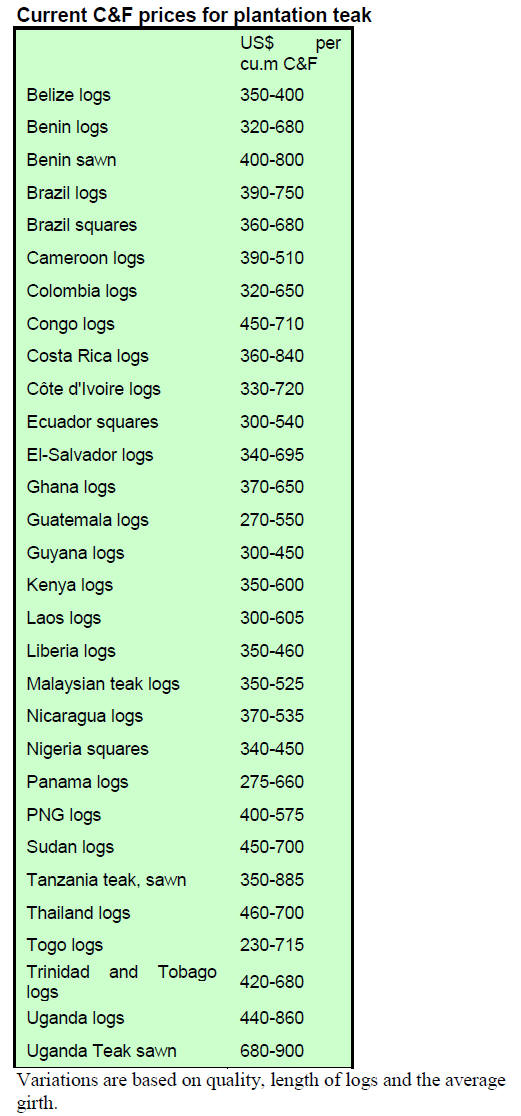
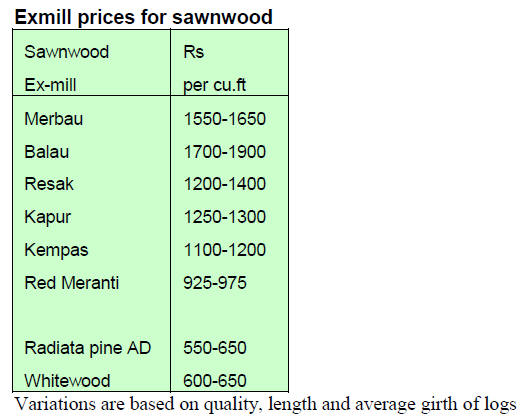
Teak stockists holding out for higher prices
Indian mills with Myanmar teak stocks are trying to push
up prices but wholesalers say there is not much scope for
price increases as endusers are strongly rejecting the prices
being quoted by sawmills.
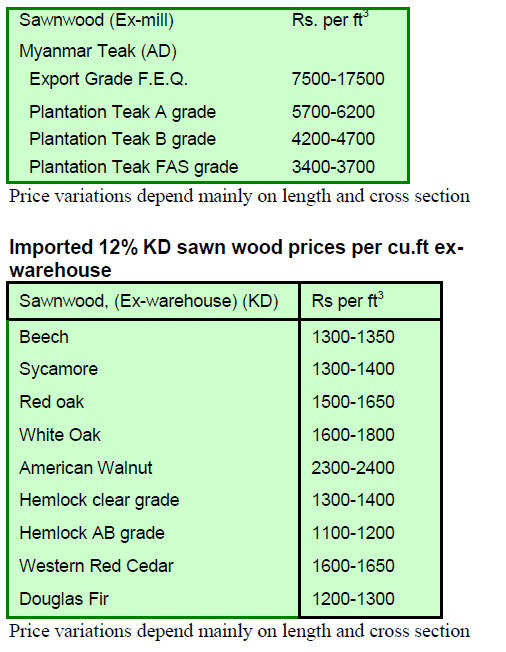
Plywood price increases inevitable
The yield of veneer from good quality imported peeler
logs is balancing the higher log cost so, at present,
plywood prices remain unchanged.
However, analysts say plywood prices in the domestic
market must eventually rise because of the combined
effect of higher log costs and increasing demand,
especially in the housing sector.
Indian housing market to get boost from new
investment
Hines, an international real estate firm has launched Hines
India Residential to invest in residential developments in
key urban centres such as the National Capital Region, the
Mumbai Metropolitan Region, Bangalore and Pune. The
housing programme planned will involve more than
US$250 million.
The press release from Hines says: ※Hines has been
present in the India real estate market since 2006 where
the firm manages approximately US$455 million of
property assets.§
For more
see:
http://www.hines.com/press/releases/9292014.aspx
In related news, Tama Home Co., Ltd. of Japan has
announced a joint venture with India‟s Developer Group
Private Ltd. See page 13 for more.
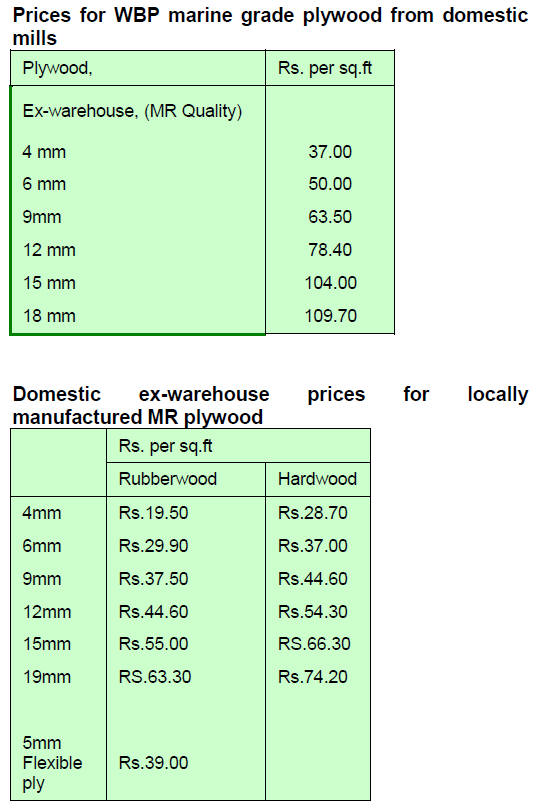
7.
BRAZIL
Bolivian importers visit furniture
cluster in southern
Brazil
The Bento Gonçalves Furniture Industry Union
(SINDMÓVEIS) hosted a meeting between importers
from Bolivia and companies of the Bento Gonçalves
furniture cluster.
The initiative provided the opportunity for Bolivian
importers to visit furniture manufacturing plants in the
Bento Gonçalves region and was supported by the APEXBrazil
Project.
Bolivia has a sound economy and is expected to generate
the second highest pace of GDP growth in Latin America
in 2014. In recent years Bolivian imports of Brazilian
furniture have been increasing such that in the first half of
2014, Bolivia was the sixth largest export market for
Brazilian furniture.
According to SINDMÓVEIS, furniture companies in
Bento Gonçalves have little experience of exporting
furniture to the Bolivian market so the objective of the
APEX-Brazil Project is to strengthen the relationship
between furniture producers and major importers in
Bolivia.
The recent event was the second organised by
SINDMÓVEIS. In 2013, SINDMÓVEIS hosted importers
from Africa to open the way to new export markets.
Timber industry benefits from changed export tax
regime
The government has brought forward the implementation
of support for exporters in the form of tax credits for
exports. Originally the Special Regime for Return of Tax
Values for Exporting Companies (REINTEGRA) was due
to begin in January 2015. Exporters will receive 3% credit
on export revenues, up significantly from the previous
0.3%.
According to ABIMCI, bringing forward the start of
REINTEGRA should stimulate growth in wood product
exports.
In related news, the government announced a R$200
million contribution to the Export Financing Program
(PROEX) for the timber industry and suspension of taxes
on imported raw materials or components used in
manufacturing products for export.
ABIMCI expects that the trade in the last quarter of the
year will improve due to government support and because
of the economic recovery in the United States.
Paran芍 State develops Reverse Logistics Plan
The wood and furniture sector of Paran芍 State has
developed a Reverse Logistics Plan (RLP). Reverse
logistics defines all operations related to the reuse of
products and materials. It is the process of planning,
implementing and controlling the efficient cost effective
flow of raw materials.
The Paran芍 timber sector represents the majority of
Brazilian wood products exports and the development of
this plan was supported by FIEP (the Paran芍 State
Industries Federation), ABIMCI (Brazilian Association of
Mechanically-Processed Timber Industry) and 15 wood
and furniture sector associations.
The RLP provides an overview of the timber sector in the
State which comprises some 5,000 companies that
generate 85,000 jobs. The Plan details the main residues
generated and how some of this can be utilised. The plan
also provides timelines for action by companies.
The next step includes building a partnership with SENAI
(the National Service of Industrial Learning) to develop
manpower training plans. In addition, work will focus on
three elements: shared responsibility, from where funding
for recycling can be generated and interaction with other
industrial sectors.
ABIMCI presented the Paran芍 Reverse Logistics Plan
during the 11th Thematic Council Meeting of
Environment and Sustainability of South-Southeast
Region of the Brazilian National Confederation of
Industry (CNI) in September and said that the Paran芍 Plan
can be an example to the rest of the country.
According to ABIMCI, they are ready to coordinate RLPs
at the national level since 16 states are represented among
its members but emphasised the joint involvement of the
private and public sectors will be necessary for any plan to
succeed since the issues of residue recycling and disposal
requires the shared responsibility of all involved in the
production chain.
Successful Australian cedar plantations in São Paulo
State
A partnership between the companies ※Bela Vista
Florestal§ and ※Apoio Florestal§, in Campo Belo (Minas
Gerais State) and Avar谷 (São Paulo State) municipalities
will invest in forest plantation of Australian cedar (Toona
ciliata). The partnership will involve technology transfer,
seedlings supply and technical assistance to rural
producers.
According to Bela Vista, the mid-west region of São Paulo
state provides favorable climatic and soil conditions for
forest plantations and to take advantage of this they are
developing superior clones. According to Apoio Florestal,
clones developed by Bela Vista should produce excellent
quality timber.
Clones of Australian cedar have been developed over the
past 15 years through a partnership between Bela Vista
Florestal and UFA (Federal University of Lavras).
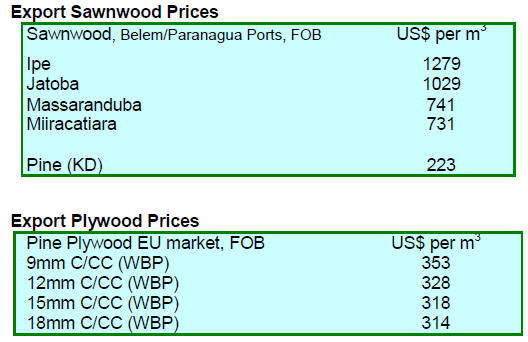
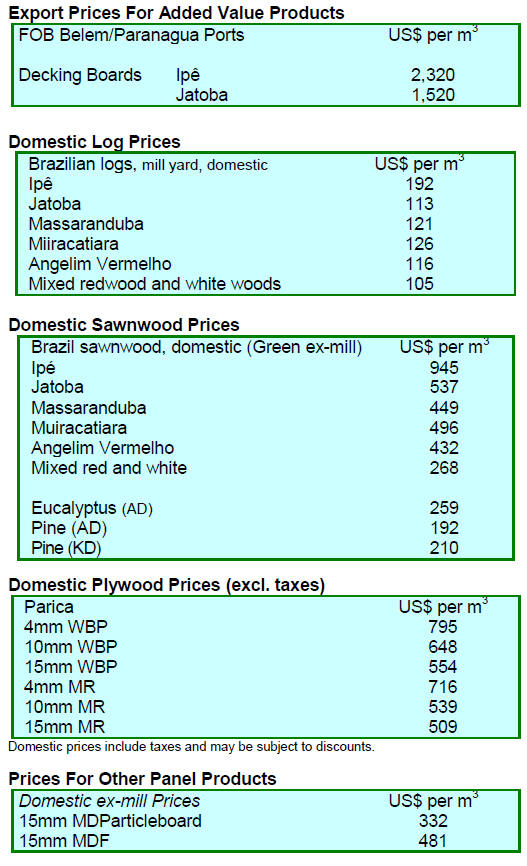
8. PERU
One billion target for exports
A presidential decree approving the development of 4
million hectares of private plantations could support a
trade in wood products of around US$1 billion in the
medium term.
Peru‟s Minister of Agriculture and Irrigation, Juan Manuel
Benites has said the passing of this presidential decree is a
major step forward in creating a sustainable forestry sector
that supports the creation one direct job for every three
hectares established.
The minister said that not only will this change increase
the contribution of the forestry sector to GDP but also
opens the door to opportunities for investment in forest
plantations by pension funds and mining companies.
FENAFOR begins October 23
In the upcoming 5th FENAFOR fair a wide range of
products and services for the woodworking and furniture
industries will be promoted.
The current fair will be held in the facilities of the
Universidad Agraria La Molina, Lima, Peru. In the 2012
event 45% of exhibitors were from abroad, mostly from
Germany, Argentina, Brazil, Colombia, Chile, Spain, Italy
and USA.
This year the organisers have expanded the capacity to
accommodate the active participation of more Peruvian
companies specialised in manufacturing machinery,
equipment and supplies for wood processing and furniture
manufacturing.
Acimall, the Italian woodworking machinery and tools‟
manufacturers association, will participate for the second
year to present the latest Italian technology.
The Forest Products Association of Ucayali will
participate to promote the use of wood from managed
forests and will focus on wood in construction.
Semi-finished wood products and finished products will be
exhibited to provide a broad vision of the possibilities of
wood as a raw material and as one of the best materials to
be used for construction and interior decoration.
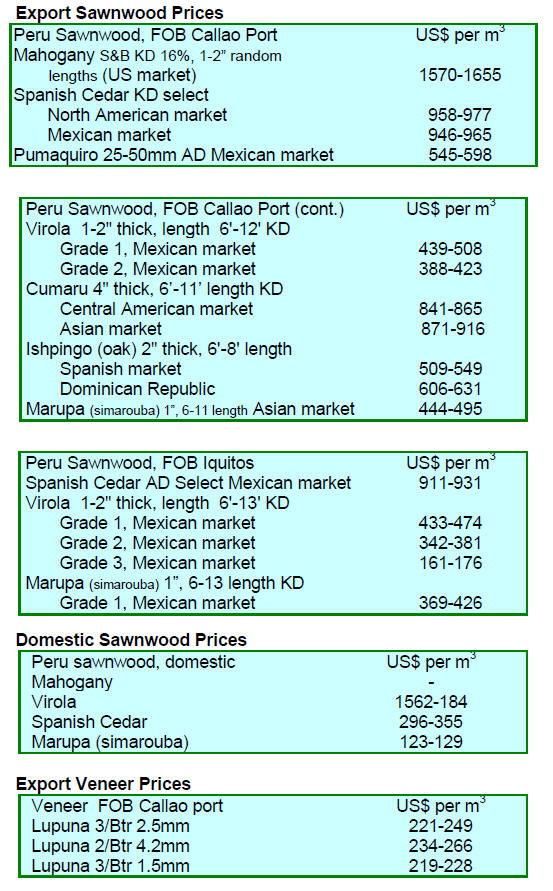
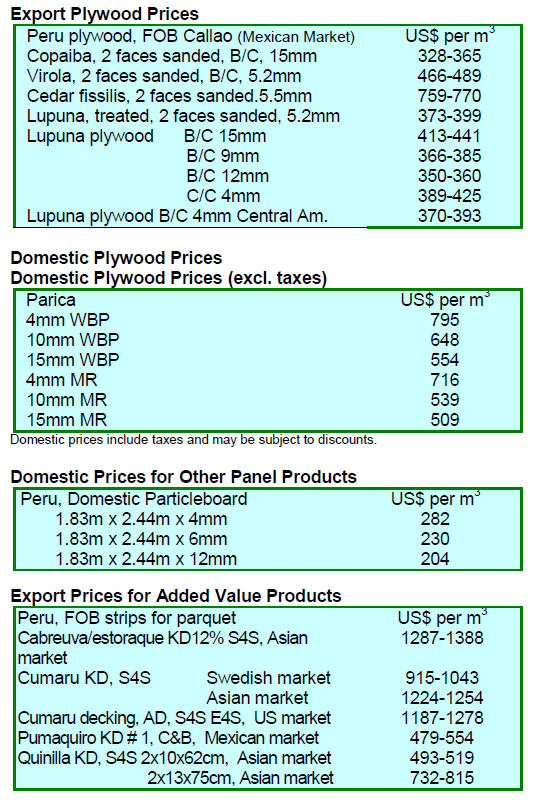
9.
GUYANA
Wood-pellet manufacturing plant for
Guyana
Pinnacle Green Resources Ltd. (Guyana) plans to begin
cultivation of an energy plantation on 5,000 acres of land
in the Pomeroon Region 2, Guyana. Pinnacle, which has
its headquarters in Singapore, is hoping to cultivate
Leucaena leucocephala which is already present in
Guyana and known as Jumbie Bean.
The company has signed a Memorandum of
Understanding with Guyana Office for Investment
(GOINVEST) for the lease of the land. Additionally, in
the period before harvesting the leucaena, the company
plans to establish another facility utilising the bio mass
available in Guyana to produce electricity.
Significant quantities of sawdust and other off cut
materials are currently available and these, along with
other agricultural residues and by-products will be used as
fuel for the gasification plant.
The plantation investment is expected to produce 200 tons
of wood pellets per day which would be exported to
Europe. The European Biomass Association estimates that
wood-pellet consumption in Europe will reach 50 million
tons per year by 2020.
Export Log Prices
There were no exports of greenheart or mora logs in the
period reviewed. Other species were exported including
wamara.
